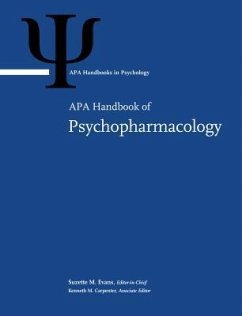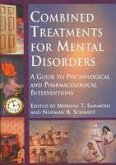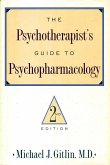APA Handbook of Psychopharmacology
Volume 1
Herausgeber: Evans, Suzette M; Carpenter, Kenneth M
APA Handbook of Psychopharmacology
Volume 1
Herausgeber: Evans, Suzette M; Carpenter, Kenneth M
- Gebundenes Buch
- Merkliste
- Auf die Merkliste
- Bewerten Bewerten
- Teilen
- Produkt teilen
- Produkterinnerung
- Produkterinnerung
Provides a comprehensive working knowledge of basic pharmacology and psychopharmacology, examines the utility of pharmacotherapy for addressing different dimensions of human suffering, and highlights the broader professional and social issues surrounding this work in a language that is suitable for a broad readership.
Andere Kunden interessierten sich auch für
![Handbook of Clinical Psychopharmacology for Therapists Handbook of Clinical Psychopharmacology for Therapists]() John D PrestonHandbook of Clinical Psychopharmacology for Therapists59,99 €
John D PrestonHandbook of Clinical Psychopharmacology for Therapists59,99 €![APA Handbook of Forensic Neuropsychology APA Handbook of Forensic Neuropsychology]() APA Handbook of Forensic Neuropsychology243,99 €
APA Handbook of Forensic Neuropsychology243,99 €![Combined Treatments for Mental Disorders: A Guide to Psychological and Pharmacological Interventions Combined Treatments for Mental Disorders: A Guide to Psychological and Pharmacological Interventions]() American Psychological AssociationCombined Treatments for Mental Disorders: A Guide to Psychological and Pharmacological Interventions27,99 €
American Psychological AssociationCombined Treatments for Mental Disorders: A Guide to Psychological and Pharmacological Interventions27,99 €![The Psychotherapist's Guide to Psychopharmacology The Psychotherapist's Guide to Psychopharmacology]() Michael J. GitlinThe Psychotherapist's Guide to Psychopharmacology40,99 €
Michael J. GitlinThe Psychotherapist's Guide to Psychopharmacology40,99 €![Losing Kali Losing Kali]() Kali Rae WheelerLosing Kali25,99 €
Kali Rae WheelerLosing Kali25,99 €![Principles of Psychopharmacology for Mental Health Professionals Principles of Psychopharmacology for Mental Health Professionals]() Jeffrey E KelseyPrinciples of Psychopharmacology for Mental Health Professionals136,99 €
Jeffrey E KelseyPrinciples of Psychopharmacology for Mental Health Professionals136,99 €![The Match: Academic/Applied Psychology and the Chemical Dependence Field: A Parallel History of Theory, Assessment, and Treatment The Match: Academic/Applied Psychology and the Chemical Dependence Field: A Parallel History of Theory, Assessment, and Treatment]() Alfred A. BorrelliThe Match: Academic/Applied Psychology and the Chemical Dependence Field: A Parallel History of Theory, Assessment, and Treatment34,99 €
Alfred A. BorrelliThe Match: Academic/Applied Psychology and the Chemical Dependence Field: A Parallel History of Theory, Assessment, and Treatment34,99 €-
-
-
Provides a comprehensive working knowledge of basic pharmacology and psychopharmacology, examines the utility of pharmacotherapy for addressing different dimensions of human suffering, and highlights the broader professional and social issues surrounding this work in a language that is suitable for a broad readership.
Hinweis: Dieser Artikel kann nur an eine deutsche Lieferadresse ausgeliefert werden.
Hinweis: Dieser Artikel kann nur an eine deutsche Lieferadresse ausgeliefert werden.
Produktdetails
- Produktdetails
- Verlag: American Psychological Association (APA)
- Seitenzahl: 776
- Erscheinungstermin: 9. April 2019
- Englisch
- Abmessung: 282mm x 224mm x 46mm
- Gewicht: 1950g
- ISBN-13: 9781433830754
- ISBN-10: 1433830752
- Artikelnr.: 54803149
- Herstellerkennzeichnung
- Libri GmbH
- Europaallee 1
- 36244 Bad Hersfeld
- gpsr@libri.de
- Verlag: American Psychological Association (APA)
- Seitenzahl: 776
- Erscheinungstermin: 9. April 2019
- Englisch
- Abmessung: 282mm x 224mm x 46mm
- Gewicht: 1950g
- ISBN-13: 9781433830754
- ISBN-10: 1433830752
- Artikelnr.: 54803149
- Herstellerkennzeichnung
- Libri GmbH
- Europaallee 1
- 36244 Bad Hersfeld
- gpsr@libri.de
Suzette M. Evans, PhD, is a psychologist trained in biopsychology at The University of Chicago and in behavioral pharmacology at the Johns Hopkins University School of Medicine. She is currently a professor of clinical neurobiology (in psychiatry) at the Columbia University Vagelos College of Physicians and Surgeons and research scientist VI at the New York State Psychiatric Institute. She has been a member of the American Psychological Association (APA) and Division 28 (Psychopharmacology and Substance Abuse) since 1992. She served as president of Division 28 in 2007 and served as a member of the APA Board of Convention Affairs from 2011 to 2014. She is also a recent past editor of the APA journal Experimental and Clinical Psychopharmacology (2011–2017). Dr. Evans has more than 100 publications and 30 years of research experience that span preclinical research with laboratory animals, human laboratory research, and clinical treatment research in substance abuse. Over the past 25 years Dr. Evans has received continuous research funding, primarily from the National Institute on Drug Abuse. Much of her research has used controlled laboratory procedures in humans to examine the acute behavioral and reinforcing effects of drugs of abuse, including alcohol, cannabis, and cocaine. Her focus is identifying potential behavioral and neurobiological markers of vulnerability to identify high-risk individuals before they transition from casual recreational use to problematic drug use. Several of these factors include stress, impulsivity, and decision making. Moreover, she has been at the forefront of exploring the role of sex as a biological variable. Much of her past and current research focuses on examining potential differences between males and females, including hormonal influences across the menstrual cycle.
Editorial Board
About the Editor-in-Chief
Contributors
A Note From the Publisher
Introduction
Part I. Fundamental Principles of Pharmacology and Psychopharmacology
Chapter 1. A Brief History of Psychopharmacology in the Context of
Psychology and Psychiatry
Chapter 2. Basic Information on Psychotropic Drugs, Receptor Systems, and
the Brain
Chapter 3. Basic Psychopharmacology
Chapter 4. The Role of Animal Laboratory Research in Psychopharmacology
Chapter 5. The Role of Clinical (Human) Laboratory Research in
Psychopharmacology
Chapter 6. Evidence-Based Pharmacotherapy
Part II. Implementing Psychopharmacology for the Treatment of Psychological
Disorders, Substance Use Disorders, and Addiction
Section 1. Pharmacological Treatment of Psychological Disorders
Chapter 7. Pharmacological Treatment of Depressive Disorders
Chapter 8. Pharmacological Treatment of Bipolar Disorders
Chapter 9. Pharmacological Treatment of Anxiety Disorders
Chapter 10. Pharmacological Treatment of Schizophrenia and Other Psychotic
Disorders
Chapter 11. Pharmacological Treatment of Obsessive-Compulsive Disorder and
Related Disorders
Chapter 12. Pharmacological Treatment of Impulse Control Disorders
Chapter 13. Pharmacological Treatment of Trauma and Stressor-Related
Disorders
Chapter 14. Pharmacological Treatment of Sleep–Wake Disorders
Chapter 15. Pharmacological Treatment of Eating Disorders
Chapter 16. Pharmacological Treatment of Attention-Deficit/Hyperactivity
Disorder
Chapter 17. Pharmacological Treatment of Autism Spectrum Disorder
Chapter 18. Pharmacological Treatment of Neurocognitive Disorders
Chapter 19. Pharmacological Treatment of Pain and Pain-Related Disorders
Chapter 20. Pharmacological Treatment of Borderline Personality Disorder
Section 2. Pharmacological Treatment of Substance Use Disorders and
Addiction
Chapter 21. General Introduction: Issues and Perspective on Medication
Assisted Treatment
Chapter 22. Pharmacological Treatment of Alcohol Use Disorder
Chapter 23. Pharmacological Treatment of Cannabis Use Disorder
Chapter 24. Pharmacological Treatment of Psychostimulant Use Disorders
Chapter 25. Pharmacological Treatment of Opioid Use Disorders
Chapter 26. Pharmacological Treatment of Sedative and Anxiolytic Use
Disorders
Chapter 27. Pharmacological Treatment of Tobacco Use Disorder
Chapter 28. Pharmacological Treatment of Behavioral Addictions
Part III. Psychopharmacology in Context: Issues Pertaining to Professional
Training, Policy, and Industry
Chapter 29. Professional Psychology in the Context of Psychopharmacology:
Ethical Issues, Education, and Training
Chapter 30. Psychologists and Integrated Behavioral Health Care Within the
Framework of Psychopharmacology
Chapter 31. The Role of the Pharmaceutical Industry in the Treatment of
Mental Health Disorders
Chapter 32. Nonpharmacological Neurotherapeutics: Principles and Methods of
Brain Stimulation Therapy
Chapter 33. Future Directions in Theory, Research, Practice, and Policy
Index
About the Editor-in-Chief
Contributors
A Note From the Publisher
Introduction
Part I. Fundamental Principles of Pharmacology and Psychopharmacology
Chapter 1. A Brief History of Psychopharmacology in the Context of
Psychology and Psychiatry
Chapter 2. Basic Information on Psychotropic Drugs, Receptor Systems, and
the Brain
Chapter 3. Basic Psychopharmacology
Chapter 4. The Role of Animal Laboratory Research in Psychopharmacology
Chapter 5. The Role of Clinical (Human) Laboratory Research in
Psychopharmacology
Chapter 6. Evidence-Based Pharmacotherapy
Part II. Implementing Psychopharmacology for the Treatment of Psychological
Disorders, Substance Use Disorders, and Addiction
Section 1. Pharmacological Treatment of Psychological Disorders
Chapter 7. Pharmacological Treatment of Depressive Disorders
Chapter 8. Pharmacological Treatment of Bipolar Disorders
Chapter 9. Pharmacological Treatment of Anxiety Disorders
Chapter 10. Pharmacological Treatment of Schizophrenia and Other Psychotic
Disorders
Chapter 11. Pharmacological Treatment of Obsessive-Compulsive Disorder and
Related Disorders
Chapter 12. Pharmacological Treatment of Impulse Control Disorders
Chapter 13. Pharmacological Treatment of Trauma and Stressor-Related
Disorders
Chapter 14. Pharmacological Treatment of Sleep–Wake Disorders
Chapter 15. Pharmacological Treatment of Eating Disorders
Chapter 16. Pharmacological Treatment of Attention-Deficit/Hyperactivity
Disorder
Chapter 17. Pharmacological Treatment of Autism Spectrum Disorder
Chapter 18. Pharmacological Treatment of Neurocognitive Disorders
Chapter 19. Pharmacological Treatment of Pain and Pain-Related Disorders
Chapter 20. Pharmacological Treatment of Borderline Personality Disorder
Section 2. Pharmacological Treatment of Substance Use Disorders and
Addiction
Chapter 21. General Introduction: Issues and Perspective on Medication
Assisted Treatment
Chapter 22. Pharmacological Treatment of Alcohol Use Disorder
Chapter 23. Pharmacological Treatment of Cannabis Use Disorder
Chapter 24. Pharmacological Treatment of Psychostimulant Use Disorders
Chapter 25. Pharmacological Treatment of Opioid Use Disorders
Chapter 26. Pharmacological Treatment of Sedative and Anxiolytic Use
Disorders
Chapter 27. Pharmacological Treatment of Tobacco Use Disorder
Chapter 28. Pharmacological Treatment of Behavioral Addictions
Part III. Psychopharmacology in Context: Issues Pertaining to Professional
Training, Policy, and Industry
Chapter 29. Professional Psychology in the Context of Psychopharmacology:
Ethical Issues, Education, and Training
Chapter 30. Psychologists and Integrated Behavioral Health Care Within the
Framework of Psychopharmacology
Chapter 31. The Role of the Pharmaceutical Industry in the Treatment of
Mental Health Disorders
Chapter 32. Nonpharmacological Neurotherapeutics: Principles and Methods of
Brain Stimulation Therapy
Chapter 33. Future Directions in Theory, Research, Practice, and Policy
Index
Editorial Board
About the Editor-in-Chief
Contributors
A Note From the Publisher
Introduction
Part I. Fundamental Principles of Pharmacology and Psychopharmacology
Chapter 1. A Brief History of Psychopharmacology in the Context of
Psychology and Psychiatry
Chapter 2. Basic Information on Psychotropic Drugs, Receptor Systems, and
the Brain
Chapter 3. Basic Psychopharmacology
Chapter 4. The Role of Animal Laboratory Research in Psychopharmacology
Chapter 5. The Role of Clinical (Human) Laboratory Research in
Psychopharmacology
Chapter 6. Evidence-Based Pharmacotherapy
Part II. Implementing Psychopharmacology for the Treatment of Psychological
Disorders, Substance Use Disorders, and Addiction
Section 1. Pharmacological Treatment of Psychological Disorders
Chapter 7. Pharmacological Treatment of Depressive Disorders
Chapter 8. Pharmacological Treatment of Bipolar Disorders
Chapter 9. Pharmacological Treatment of Anxiety Disorders
Chapter 10. Pharmacological Treatment of Schizophrenia and Other Psychotic
Disorders
Chapter 11. Pharmacological Treatment of Obsessive-Compulsive Disorder and
Related Disorders
Chapter 12. Pharmacological Treatment of Impulse Control Disorders
Chapter 13. Pharmacological Treatment of Trauma and Stressor-Related
Disorders
Chapter 14. Pharmacological Treatment of Sleep–Wake Disorders
Chapter 15. Pharmacological Treatment of Eating Disorders
Chapter 16. Pharmacological Treatment of Attention-Deficit/Hyperactivity
Disorder
Chapter 17. Pharmacological Treatment of Autism Spectrum Disorder
Chapter 18. Pharmacological Treatment of Neurocognitive Disorders
Chapter 19. Pharmacological Treatment of Pain and Pain-Related Disorders
Chapter 20. Pharmacological Treatment of Borderline Personality Disorder
Section 2. Pharmacological Treatment of Substance Use Disorders and
Addiction
Chapter 21. General Introduction: Issues and Perspective on Medication
Assisted Treatment
Chapter 22. Pharmacological Treatment of Alcohol Use Disorder
Chapter 23. Pharmacological Treatment of Cannabis Use Disorder
Chapter 24. Pharmacological Treatment of Psychostimulant Use Disorders
Chapter 25. Pharmacological Treatment of Opioid Use Disorders
Chapter 26. Pharmacological Treatment of Sedative and Anxiolytic Use
Disorders
Chapter 27. Pharmacological Treatment of Tobacco Use Disorder
Chapter 28. Pharmacological Treatment of Behavioral Addictions
Part III. Psychopharmacology in Context: Issues Pertaining to Professional
Training, Policy, and Industry
Chapter 29. Professional Psychology in the Context of Psychopharmacology:
Ethical Issues, Education, and Training
Chapter 30. Psychologists and Integrated Behavioral Health Care Within the
Framework of Psychopharmacology
Chapter 31. The Role of the Pharmaceutical Industry in the Treatment of
Mental Health Disorders
Chapter 32. Nonpharmacological Neurotherapeutics: Principles and Methods of
Brain Stimulation Therapy
Chapter 33. Future Directions in Theory, Research, Practice, and Policy
Index
About the Editor-in-Chief
Contributors
A Note From the Publisher
Introduction
Part I. Fundamental Principles of Pharmacology and Psychopharmacology
Chapter 1. A Brief History of Psychopharmacology in the Context of
Psychology and Psychiatry
Chapter 2. Basic Information on Psychotropic Drugs, Receptor Systems, and
the Brain
Chapter 3. Basic Psychopharmacology
Chapter 4. The Role of Animal Laboratory Research in Psychopharmacology
Chapter 5. The Role of Clinical (Human) Laboratory Research in
Psychopharmacology
Chapter 6. Evidence-Based Pharmacotherapy
Part II. Implementing Psychopharmacology for the Treatment of Psychological
Disorders, Substance Use Disorders, and Addiction
Section 1. Pharmacological Treatment of Psychological Disorders
Chapter 7. Pharmacological Treatment of Depressive Disorders
Chapter 8. Pharmacological Treatment of Bipolar Disorders
Chapter 9. Pharmacological Treatment of Anxiety Disorders
Chapter 10. Pharmacological Treatment of Schizophrenia and Other Psychotic
Disorders
Chapter 11. Pharmacological Treatment of Obsessive-Compulsive Disorder and
Related Disorders
Chapter 12. Pharmacological Treatment of Impulse Control Disorders
Chapter 13. Pharmacological Treatment of Trauma and Stressor-Related
Disorders
Chapter 14. Pharmacological Treatment of Sleep–Wake Disorders
Chapter 15. Pharmacological Treatment of Eating Disorders
Chapter 16. Pharmacological Treatment of Attention-Deficit/Hyperactivity
Disorder
Chapter 17. Pharmacological Treatment of Autism Spectrum Disorder
Chapter 18. Pharmacological Treatment of Neurocognitive Disorders
Chapter 19. Pharmacological Treatment of Pain and Pain-Related Disorders
Chapter 20. Pharmacological Treatment of Borderline Personality Disorder
Section 2. Pharmacological Treatment of Substance Use Disorders and
Addiction
Chapter 21. General Introduction: Issues and Perspective on Medication
Assisted Treatment
Chapter 22. Pharmacological Treatment of Alcohol Use Disorder
Chapter 23. Pharmacological Treatment of Cannabis Use Disorder
Chapter 24. Pharmacological Treatment of Psychostimulant Use Disorders
Chapter 25. Pharmacological Treatment of Opioid Use Disorders
Chapter 26. Pharmacological Treatment of Sedative and Anxiolytic Use
Disorders
Chapter 27. Pharmacological Treatment of Tobacco Use Disorder
Chapter 28. Pharmacological Treatment of Behavioral Addictions
Part III. Psychopharmacology in Context: Issues Pertaining to Professional
Training, Policy, and Industry
Chapter 29. Professional Psychology in the Context of Psychopharmacology:
Ethical Issues, Education, and Training
Chapter 30. Psychologists and Integrated Behavioral Health Care Within the
Framework of Psychopharmacology
Chapter 31. The Role of the Pharmaceutical Industry in the Treatment of
Mental Health Disorders
Chapter 32. Nonpharmacological Neurotherapeutics: Principles and Methods of
Brain Stimulation Therapy
Chapter 33. Future Directions in Theory, Research, Practice, and Policy
Index








